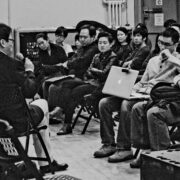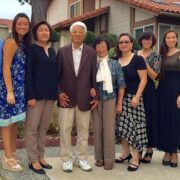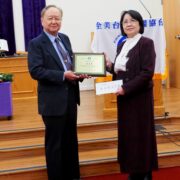REFLECTIONS ON RETURNING TO TAIWAN
by Linda Gail Arrigo
August 1990 in Taipei
Precisely at 3:05 pm on the afternoon of July 8, 1990 Shih Ming-deh and I arrived at the train station at Chiayi. Many friends were there to greet us. Firecrackers burst in multitudes, we were draped with colorful plastic flower garlands, and were set to stand on top of a campaign truck in a cavalcade of welcome.
But since the sun was hot beating down on our heads and the fanfare seemed anomalous outside of an election season, I felt we were perhaps an incongruous parade. Still remembering the burden of defamation we had had to bear after the Kaohsiung Incident, and the tension of our daily lives then, surrounded by riot troops and plain clothes agents on every public occasion, for a moment I imagined that we were “criminals”, revolutionaries being taken to the execution fields and haplessly making our last appeal to the public — not the returning heroes of the present moment. Ten years ago, I had been labelled in government propaganda as the foreign instigator, the one who incited guileless natives to revolt. And I stood at the side of my comrade-lover, the ringleader of the revolt, the insidiously intransigent mastermind of the incident, one who had twice faced life imprisonment without a twinge of remorse. But now we displayed our bravado with warm smiles to the surprised populace of Chiayi. The motorcycles and cars paused in traffic. There was among them a pretty foreign girl with flowing blond hair, about twenty years old, on the back of a motorcycle. Her companion was a young local man, handsome, with straight black hair. She looked up quizzically at me. She must have found it hard to fathom what this parade was about, and why a foreign woman was standing on top of a campaign truck. Unable to explain, I merely smiled at her, and after a moment’s hesitation she smiled back. I thought again. Twenty years ago, I could have been her.
I am 41 years old now. I graduated from Taipei American High School in 1966. I married a native of Wanhwa, the oldest area of Taipei, when I was 19, and from his family received a rich heritage of Taiwanese culture. His home, a few blocks from the Dragon Mountain (Lungshan) Temple, was crowned with an ornate dark wood altar carrying the tablets of his ancestors; his grandmother, a tiny woman with silver hair and bound feet, lived at her own temple in the foothills of Sanhsia, the ancestral home. My own son is 21 now and a senior at MIT; his first language is English, but he maintains a deep sense of Taiwanese identity. So much has happened for me and for Taiwan in this short generation. And I feel that my Caucasian face belies my experience as part of this generation of Taiwanese both at home and overseas. I know that I am very rarely understood in my own terms, from my own viewpoint. So again, how did I come to be called “the foreign instigator”?
When I came to Taiwan in 1963 with my father, retired from the Military Assistance Advisory Group on Taiwan a few years earlier, we lived near National Taiwan University (Taida). I was fourteen then. On the streets around the area, the Japanese-style houses with their heavy gray tile rooves were ringed with concrete walls topped by broken glass; but their red gates were usually left open to catch the breeze. The middle of Hsinsheng South Road, which flanked the university, was a big ditch; it was lined with trees, and goats grazed on its banks. The place had a slow tropical air.
The rice and shaved ice shops across from the Taida entrance were somewhat grimy, a few lazy flies buzzing by one’s plate; but the food was cheap and good. Foreign and overseas Chinese students came and went from the university gates, and occasionally they talked furtively with local students about international issues and rumors about the Chinese mainland, so near and so forbidden. A vague sense of danger seemed to make the discussion all the more tantalizing to me.
Though only fourteen or fifteen, I roamed alone, day or night, through markets, temples and workshops. I sought to find the most mysterious, the strangest, the most native. The air was heavy with the smoke of incense, the blood of meat stalls, the reek of the sewage collectors, and the sweet wafting flavors of the street vendors; and the jangle of pedicab bells, the wail of funeral horns, the crackle of firecrackers: all jumbled into an atmosphere pungent, humid, strange, alluring. I wandered into small shops pounding cotton batting for quilts, stamping plastic buttons, or shaving small metal tools. I was crushed in the human flood at the Dragon Mountain Temple on Lantern Day, but still pushed to the front to stare at the marvelously colored lights. I got lost near Yuan Huan market in the Yenping district and ended up in a narrow alley filled with soldiers, where the shops laid out women under pink neon lights like pork legs in a meat market. Once I sneaked with a friend through all the dank underground corridors and massive kitchens of the nunnery built into the mountainside at Chih Nan Kung, and then we skipped down the thousand stone steps in the moonlight at breakneck speed.
Now, after ten years exile, I have wanted to find the past of my childhood, the roots of my identity with this island, whose green mountains I have remembered these many years as a mass of sensuous, quivering foliage. My return is not for me only a matter of seeing my friends and comrades released from prison and raised to positions of respect in this newly-affluent society, but of understanding what propelled myself, ostensibly a foreigner, to stand in their ranks. For this it has been important to me to again roam the streets with my own two feet. We have been welcomed with endless delicious feasts served in air-conditioned splendor. But for most of my life I have lived in limited, though not unpleasant, economic circumstances, and the waste produced by banquets tends to disturb me even while I enjoy the food. Much to Shih Ming-deh’s chagrin, I have finally refused almost all invitations, to use my time wandering by myself.
For the first few days after returning to Taiwan, I had little sense of direction, though I recognized some of the major intersections and buildings in Taipei. The streets had been built up with too many high-rise skyscrapers and unfamiliar signs — what did Ka-La-O-K mean, I wondered? In particular, the East Section seemed a different world from what I had known before, all large luxury restaurants and clothing boutiques, inhabited by rich and trendy young shoppers. One night we were driven to the coffee shop run by our old friend Yang Ching-chu, the native-literature novelist, and then Shih Ming-deh asked me to go down to buy newspapers. From the neon lights and sleek shops, I thought I was still in the East Section. Approaching the corner, I suddenly realized that the dark trees across the broad intersection were those at the entrance to National Taiwan University, and that I was standing at the door of a remodelled Good Friends Photo Studio, where like other generations of Taida students I had had my school identification pictures taken, 25 years ago. How many hundreds of times I had crossed this spot! And yet for many moments it seemed strange to me. A few tears streaked down my cheek, involuntarily; as if I had failed to recognize a past lover.
Over several expeditions I searched out the places where I lived in the past. In 1963-67 I lived on Lane 269, Section 3, Roosevelt Road, the same lane as the present Presbyterian Church headquarters — a place that I could not then know would be deeply tied with the fate of my future husband [1]. Where I lived is now a large apartment building facing on the same small triangle park, the trees grown big. There used to be a small Catholic church not far away, with a large and jovial Belgian priest, a veteran of over twenty years on the mainland. All this was swept away to make room for the automobiles and trucks roaring by in a cloud of dust on the new extension of Hsin Hai expressway.
In those years my father was a member of the Officers Club on Chung Shan North Road, which then was considered a place of prestige. Mrs. Anna Chennault [2], whose daughter Claire was my best friend at Taipei American High School, was often seen there, as well as ranking military officers and bureaucrats of the “R.O.C.” In retrospect, I would say that the club was a neo-colonial outpost that reflected the international polity in the time of U.S. ascendancy; for mostly ordinary Americans and their families frolicked in the swimming pool and ate American roast beef there, recreating a lifestyle far beyond that of the ordinary people of Taiwan. I danced to my senior prom in the ballroom. Now, well-maintained but unredecorated all these years, the club looks tawdry compared to the gilded restaurants and lavish entertainments of Taipei businessmen.
During my second long sojourn in Taiwan, as a Stanford graduate student coming to study the new phenomenon of factory work for women, I lived in a tile-roofed Japanese-period house in Hsintien, a south suburb of Taipei, from May 1977-February 1979. Shih Ming-deh lived there with me for almost a year, but after the Chiao Tou march [3] the landlord, a mainlander, forced us to move. It had had a shady old lien-wu tree — bearing a watery pink-skinned fruit in a lumpy shape, whose name I have never heard in English — , a patch of dirt I planted with ferns from the mountains, and a concrete tank in which I raised gold koi carp. I tried to find Da Feng Road where it joined the main highway through Hsintien. I walked by several times before realizing that the big fried chicken fast-food joint with shiny plate glass windows and automatic sliding doors, such as one might frequent in Los Angeles, marked the entrance to the road. The courtyard where I had lived was now a claustrophobic mass of five-story apartment blocks, airless and simmering in the summer heat.
In sum, I had to recognize that my past of just a dozen years before was largely obliterated, covered over by the needs and the lives of a new generation, and in some sense it lived only in my memory. And the new generation might not understand that physical past any more than it would understand the cloak of heavy fear that in that time almost smothered the impulse to think freely and logically: the terror of unseen eyes and ears, both real and imagined, watching for “seditious” word or thought. Then, as a foreigner with habits of incessant curiosity and principles of academic inquiry, and moreover with political understanding and experience similar to that of contemporary Taiwanese-Americans, i.e. participation in the 1971-72 Diao-yu-tai movement and the subsequent setting up of Taiwanese associations abroad [4], I also felt angry at such suppression of speech and distortion of thought, and I was naive enough and stupid enough not to know the consequences of protest. I did find out the consequences; it was a great revelation to me, and the revelation brought a kind of liberation and an exhilarating sense of aliveness — a deeper immersion in social reality than I had ever imagined from sociological tomes. But again, now, perhaps it is just as well that the present young generation doesn’t remember. They start anew from here, facing the contemporary problems of their society. And I must start anew also.
Sometimes, when faced with the admiring crowds who recognize me and my husband on the streets, but hesitate to address me in fear that I don’t understand their language; or when cornered by reporters who want to ask questions about my reunion with Shih Ming-deh and make it out to be either a traditional love story or a modern scandal, then sometimes I wish I could again be but a bumbling, friendly foreigner on the street, both curious and the object of simple curiosity. I fondly remember being welcomed without pretense to a country feast (bai bai) by farmers proudly displaying their decorated pigs; or invited into a small factory by businessmen hoping to learn a few words of English. Now I occasionally feel intimidated by attention and by the celebrated and ceremonial role I must play.
But I have thought the issue through. If in the past I refused to be deterred by the dark forces of the Kuomintang security agencies — “cockroaches” in the phones, behind one’s back on the streets, and even spies planted among acquaintances — then in the present I can just as adamantly refuse to be squeezed into the mold of perfect wife to the hero, or prestigious and decorous politician, or anything but myself. But because I am a cultural anomaly — a Taiwanized American — and a rebel as well, I feel that in order to escape others’ stereotypes I must insist on my own self-definition. For this I must come to terms with the contradictions I face as an American and a woman in the social and political movements of another country.
Many, if not most, political movements around the world, and especially those of Latin America, resent whites in general and Americans in particular. They often resent whites who are not military or government, even whites who are concerned with social issues and human rights in their country, because they suspect, often correctly, that there is an air of patronization and condensation in that concern — as if “you brownskins will never get the revolution right unless we advanced peoples help you.” Such resentments may be particularly marked in nationalistic movements.
So I have been waiting for someone to complain that the wife of a well known Taiwanese nationalist is not Taiwanese. But I have not yet heard such a complaint, I think because there is sincere appreciation for my human rights work, and moreover probably because it is assumed in folk consciousness that a woman takes on the nationality of her husband. Though I have not heard any complaint that I am an American, I have encountered many polite wishes and joking demands that I conform to the standards of an obedient and traditional Taiwanese wife, one mainly concerned with caring for her husband and his career. The further stereotype is that the proper Taiwanese wife has no plans or identity of her own. It is not surprising that if I speak at public rallies the crowds want to hear me speak not English, not Chinese [5], but Taiwanese. But it doesn’t really matter what I say, just as long as it is in Taiwanese, however halting, to demonstrate that I am trying hard to assimilate. Of course it is even better if I say, “I am a daughter-in-law of Taiwan”. Accepting the legacy of American global superiority, people are especially proud that an American woman would become a Taiwanese. And people say again and again that they appreciate what I did, that I made an effort for the Taiwan democratic movement even though it wasn’t my own country. I feel strange when they say that. To myself, I say, isn’t it my country too?
Actually, not just myself, but many Americans, Japanese, Dutch, Canadians and persons of other nationalities participated in Taiwan human rights work early on. Most of this work was secret up to 1980, and so their contribution is not widely known, while I gradually took on a public role. It was often up to us to enlist the aid of American students and tourists to carry letters and reports in and out of the country and thus evade the usual censorship of mail. This work was entirely amateur and haphazard, so even though the security agencies caught us again and again, they couldn’t stop us entirely. With my ease in bilingual communication, I was more often in the forefront in collecting the basic information on cases of political persecution and guiding reporters to meet with dissidents.
Often other American graduate students, especially those doing sociological research in Taiwan, were eager for me to brief them in detail about the political situation; but such students were just as reluctant to get involved personally. For example, when I asked one such young man to assist with some contacts in Japan, his answer articulated what was often an unspoken undercurrent. “If the security agencies find out, your Taiwanese friends will be arrested and tortured, but you will just be deported because you are an American. How can you take that right? Aren’t you just using them in your game of foreign human rights activist?”
Again and again I faced this argument in my own heart; finally I formed the answer. First of all, the essence of what I did was merely to respond to requests for assistance from those who were the actual or prospective targets of suppression. Some of those I met, such as the grief-stricken relatives of political prisoners, did refuse foreign publicity, out of fear of government retaliation if the source of information became apparent; others resolutely sought me out. Those who made requests, such as my long-time friend and mentor Chen Chu, a courageous woman who pulled together the early circles of activists just through her force of personality, had already taken upon themselves the responsibility for the consequences. If I refused to assist on the basis of the above argument, I would in effect be denying their right to act to demand a better society, whatever the cost. Moreover, without international concern for them they would be subject to even more severe punishment. So because I would suffer less than a local activist, I thought I should do more. I was proud of what I did, but knew it was not just a game for my self-gratification. I would suspect that the Americans who advanced the paternalistic argument for non-involvement were actually more concerned about their academic achievements and the possibility of losing their research projects — just as mine was confiscated when it was nearly complete, and myself deported following the Kaohsiung Incident [6].
As I mentioned, Americans are often criticized for arrogance. It is true that in the past I have much appreciated the prestige of the nationality, that before the recent years in which Taiwanese can travel and communicate easily on their own they eagerly sought news of the outside and a little practice of conversation from any passing “big nose”. But I don’t feel I have had much opportunity to be arrogant. In American society I am merely an impoverished perennial student, a remnant of the idealistic 60s that is no more than flotsam in the sea of 80s materialism. And as I have moved into the Taiwanese political movements I have been decisively outnumbered by associates whose immediate crisis in the ongoing experience of unequal battle within Taiwan is most overwhelming. My own political and personal perspective is somewhat different, shaped by American anti-war and feminist currents of two decades ago, and by a broad study of Third World countries. Only in recent years have I been heartened and accompanied by a new younger cadre of Taiwanese intellectuals.
My perspective includes a strident demand for equality and open communication between the sexes, and for personal freedom and self-realization. As a result, I have little inclination and no intention to serve as the standard Taiwanese wife. For me, I planned marriage to resolve the security agencies’ threat of deportation at that time; I purposefully sought out the most resolute former political prisoner that was recommended to me. And the fact that in 1978 a former political prisoner thought to marry an American when protection was needed for his goal of forming an opposition party reflects the historical circumstances of that time: that the regime was dependent on the American government and thus afraid of American public opinion; and that Taiwanese activists depended considerably on concerned foreigners to provide the slender link to the outside world.
When Shih and I married we had a mission to carry out together, an adventure and a challenge. We had no money, no social position, no personal security, but I felt deeply that his courage and determination demanded my commitment. Whatever sacrifices this engendered in my life were more than compensated for by the meaning this gave to my life and my actions; that as one individual I could make a moral statement that shaped history.
Reflecting on my adolescence in Taiwan and my young adulthood among Taiwanese in the United States, I see also that it is no accident that in 1975 I should have determined to leave my son and comfortable home in California and commit myself, not knowing any of the future, to delving into the social and political issues of Taiwan. In that summer of 1975 I met Chen Chu and Chen Ku-ying, both of whom exposed me to the victims of political oppression; in my study of girl factory workers I saw the hapless victims of economic oppression; I found evidence that my country, the United States, had a hand in both. And I felt compelled to struggle against that oppression because in my gut feeling the victims seemed like my husband and my son.
And I belong to the history of the Taiwan democratic movement together with all those who lived it.
NOTES
Author’s Note to the Reader: I felt compelled to write this very personal article in response to the well-meaning but personally disturbing misperceptions and contradictions which I have long encountered. These were intensified in the triumphant emergence of the hero of Taiwan nationalism, Shih Ming-deh, from long imprisonment on May 20, 1990, and my return as his longsuffering wife a few days later. The laurels do not always fit comfortably. To my chagrin, I had even been lauded in a newspaper editorial as a wife displaying the Confucian “four virtues and three obediences”. The present article, prepared originally for translation into Chinese, was printed in several Taiwan newspapers in September 1990. Revisions and notes for the non-Taiwanese reader have been added, August 1991.
- After escaping arrest on the morning of December 13, 1979, Shih Ming-deh was given sanctuary by ministers of the Presbyterian Church, which had long since taken a courageous position on human rights and national self-determination. For this Rev. Kao Chun-ming, General Secretary, and others were sentenced to seven years in prison, and served up to five.
- General Chennault headed the Flying Tigers, a squad of American pilots who assisted the Nationalist’s struggle against Japanese invasion starting before the U.S. entered the war officially. Subsequently they were closely identified with and received honors from the “Republic of China” elite, after 1949 refugees from the communist insurgency in China and ensconced in Taiwan. The young Chinese reporter he married and left a widow, Anna (Chen Hsiang-mei), became a celebrated Watergate hostess in Washington in the Nixon era.
- This was the first public protest against political arrest since the 2-2-8 1947 uprising and massacre of Taiwanese by the Nationalist troops. Shih and myself were among the organizers for the march, on January 22, 1979.
- In 1971 a territorial dispute arose concerning sovereignty over a small group of uninhabited islands north of Taiwan, which the United States planned to cede back to Japan together with Okinawa. Initially a movement of pro-government students in Taiwan supporting the Republic of China’s claim, it rapidly became a movement among Chinese students abroad excoriating the impotence of the government. When the movement, further exhilarated by Nixon’s rapprochement with China and manipulated by the PRC embassy in Ottawa, turned to strident Chinese nationalism and calls for reunification of Taiwan with China, native Taiwanese went their own way. They began developing organizations celebrating their own language and ethnicity, which the KMT government considered inherently seditious. These organizations, in the United States, Japan, Europe, and Brazil, were fairly well established by the mid-70s, and soon served as an important base for the support of the democratic movement in Taiwan.
- Most of the population of Taiwan understands Mandarin Chinese, well, and I speak it quite fluently, but because of the association of Chinese with the cultural chauvinism of the regime, use of that language at opposition rallies is often booed.
- The Taiwan democratic movement, best known by the name of its final frontspiece, Formosa magazine (Mei-li-dao), moved through rapidly expanding mass participation and escalation of the public confrontation with government suppression to its culmination in a Human Rights Day march in the city of Kaohsiung on December 10, 1979. A riot sparked by agent provocateurs was the government’s excuse for a complete roundup of the opposition politicians and activists, totaling hundreds of arrests. Shih Ming-deh, one of the core of five leaders of the movement, made a stunningly defiant defense at the trial, and was sentenced to life imprisonment for sedition. Four decades of martial law were finally ended in 1987.
Source from Linda Gail Arrigo 02/2017
Posted in 03/2017





